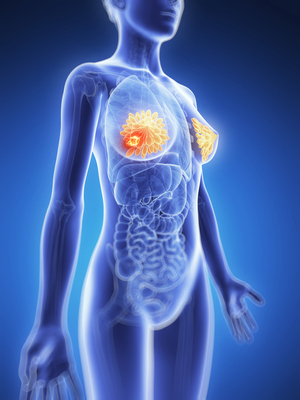Can A Multivitamin A Day Keep Breast Cancer At Bay?
Author: Dr. Stephen Chaney
 A few weeks ago I wrote about soy and breast cancer survival. You’ve probably seen the latest headlines: “Multivitamin Supplements May Reduce Breast Cancer Mortality” and are wondering if they could possibly be true. After all, wasn’t it just a short time ago that the headlines said “Multivitamin supplements have no effect on breast cancer mortality” or that “Multivitamins may increase your risk of death”?
A few weeks ago I wrote about soy and breast cancer survival. You’ve probably seen the latest headlines: “Multivitamin Supplements May Reduce Breast Cancer Mortality” and are wondering if they could possibly be true. After all, wasn’t it just a short time ago that the headlines said “Multivitamin supplements have no effect on breast cancer mortality” or that “Multivitamins may increase your risk of death”?
With all the conflicting headlines, you have every right to be skeptical about the latest news. So perhaps we should start with looking at the previous studies and discussing why they disagree.
What do we know about multivitamin use and breast cancer survival?
Three very large studies have reported no correlation between multivitamin use and breast cancer incidence. So it is pretty clear that multivitamins don’t prevent breast cancer.
However, breast cancer incidence and breast cancer survival are two different things. In the first case you are starting with healthy women and asking how many of them develop cancer. That is what we scientists call a primary prevention study. It is very difficult to prove the effectiveness of any intervention in a primary prevention study. In the second case you are starting with a sick population and asking if an intervention provides a benefit. It is much easier to prove whether or not an intervention is effective in this kind of study.
There, have been several small studies looking at the effect of vitamin supplementation in women who already had breast cancer. While the results have been mixed, the majority of the studies showed that vitamin supplementation did appear to reduce breast cancer recurrence and mortality.
What makes this study different?
The women in this study were part of 161,608 women enrolled the Women’s Health Initiative (WHI) study to investigate the effects of multivitamin use in post-menopausal women. In fact, this was one of the studies to report no effect of multivitamin use on the incidence of breast cancer (Neuhouser et al, Arch. Intern. Med., 169: 294-304, 2009).
What the present study did was to look at the those women in the WHI who did develop breast cancer during the previous study and followed them for an additional 7.9 years to see if multivitamin use affected breast cancer survival (Wasserthiel-Smoller et al, Breast Cancer Res. Treat., 141: 495-505, 3013).
This is the largest study of its kind (7,728 women). It started with an older and sicker group of women than previous studies. All of the women were 50-79 years old at the time the study began, and all of them had invasive breast cancer at the time of enrollment into the study.
The results were quite impressive. Multivitamin use improved survival by 30%, and the results were highly significant.
Strengths of the Study:
- This was a large and very well controlled study. The authors did an excellent job of controlling for confounding variables that might have affected the outcome.
- Multivitamin use was measured at multiple time points. It was assessed at enrollment into the original WHI study and at each subsequent doctor visit. The multivitamin usage for the purpose of data analysis was the usage at the time of breast cancer diagnosis, but the authors also corrected for any change in vitamin use post-diagnosis.
- The study was in agreement with the majority of previous studies, further strengthening the conclusion that multivitamin use in women with breast cancer improves the likelihood of survival.
Weaknesses of the Study:
- Because previous studies have been mixed with respect to the effect of multivitamins on breast cancer survival, further placebo controlled intervention studies will be required before multivitamin use becomes part of the standard of treatment for breast cancer patients.
- Most of the women in the study were post-menopausal. It is unclear if multivitamins will provide the same benefit to pre-menopausal women with breast cancer.
- This study measured consistent multivitamin use before and after the diagnosis of breast cancer. It did not look at women who began multivitamin use after diagnosis. So we have no idea whether starting multivitamin use after diagnosis would have also been beneficial.
The Bottom Line:
1) This study strongly suggests that multivitamin use may help improve your chances of survival if you are unlucky enough to develop breast cancer. While more studies are still needed, this study certainly strengthens the argument for multivitamin use.
2) The rap on multivitamins has always been that they aren’t needed by healthy people who have a good diet. However, multivitamins are important for assuring good nutritional status if your diet is not optimal or if you have increased nutritional needs – either because of your genetic makeup or because of illness.
3) The difficulty is that you usually don’t know if your genetics increases your vitamin needs, and once your disease has progressed far enough to be diagnosed it may be too late to improve disease outcome. That’s why many experts consider a multivitamin supplement as an inexpensive form of nutritional and health insurance. I concur.
4) As for the fear that multivitamins might just kill you, that hypothesis has been disproven by several subsequent studies including one published just a couple of weeks ago (Macpherson et al, Am. J. Clin. Nutr., doi: 10.3945/ajcn.112.o49304).
These statements have not been evaluated by the Food and Drug Administration. This information is not intended to diagnose, treat, cure or prevent any disease.
